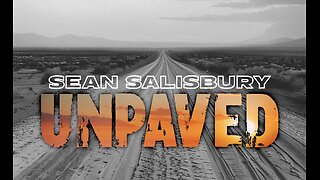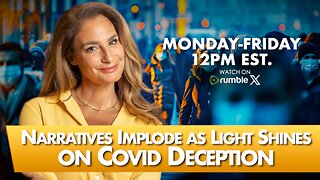Premium Only Content

Vibes over logic? Americans are making big life choices on intuition
Gut feelings, prayers and "pure vibes" are influencing Americans' major decisions, according to a new study.
The poll of 2,000 U.S. adults split evenly by generation found seven in 10 base their big decisions on some sort of factor, ranging from their intuitions (36%), prayers (29%) and general vibes (19%).
Two in five Gen Z (22%) based these choices on social media posts and a similar number of millennials (17%) said it was due to cosmic signs from the universe.
Respondents said following these holistic signs have helped them choose new jobs (32%), decide where to move (26%) and when to end a relationship (26%). Others’ decisions range from when to quit an old job (24%), when to get a pet (21%) or even what to invest their money in (20%).
Almost one-third of baby boomers (31%) purchased a home based on these signs, while 23% of Gen Z have chosen a focus or major in further education and 17% of millennials have started a busines.
And 71% of all respondents said they have "zero" regrets about their decisions as a result.
Conducted by Talker Research on behalf of Life Happens for Life Insurance Awareness Month, results revealed generational patterns of major purchase decisions.
According to the results, Gen Z most often facilitates battles between their head and their heart or between logic and passion. When it comes to making decisions about relationships, jobs and even food, 42% of Gen Z said their heart rules their head, compared to just 28% of baby boomers.
But when it comes to making financial decisions specifically, the head and the heart flip places: 67% of Gen Z say they’re ruled by their head, 69% for both millennials and Gen X, and 83% of baby boomers.
During an average month, the youngest generation comes across something where their heart says “yes,” but their wallet says “no” 10 different times, compared to eight for millennials and Gen X and only five for baby boomers.
Head and heart aside, Americans are also turning to others close to them before making a large purchase over $500: Gen Zers consult six people, millennials consult seven, Gen Xers consult five and baby boomers only consult three.
People consult with their partner (40%), parents (27%), best friends (25%) and siblings (18%) before making large purchase decisions. Consulting a financial professional (7%) comes in even behind Googling (15%) and social media (9%).
Nearly half (47%) believe if it "feels" right to them, that's enough to justify a major expense and figure out how to pay for it later. That belief was strongest amongst millennials (61%).
"Leading with your head, but informed by your heart, is a great way to make solid financial choices. But if you’re already consulting up to seven people when making a big decision, why not make sure one of them is a financial professional?” says Kevin Mayeux, CEO of the National Association of Insurance and Financial Advisors. “The bottom line is that your financial well-being can enhance all your other decision-making.”
Results found more than half (56%) subscribe to the idea of "spending money while they're alive" rather than saving for future generations (34%). That line of thinking, it seems, includes end-of-life financial planning.
Almost half (46%) said they don’t feel prepared for end-of-life planning, and nearly the same amount (48%) don’t feel financially prepared for the latter half of their life either.
Still, many shared that they do have certain end-of-life preparations already in place, like having life insurance (34%), a will (29%) and a trust (16%).
Respondents said they are likely to prioritize end-of-life planning and preparation if they experienced a health scare (28%), received a poor health diagnosis (26%) or experienced a health scare or death of a loved one (20%).
“People may not know that life insurance is an easy and affordable way to get this planning started. But don’t wait, because the best time to get it is when you are young and healthy. It can be more complicated if you have a health scare or diagnosis,” says Brian Steiner, Executive Director of the educational nonprofit Life Happens, a NAIFA community. “And if a ‘cosmic nudge’ is helpful, then consider this your sign from the universe to get the life insurance coverage you need.”
WHAT DECISIONS ARE GUT FEELINGS, PRAYERS, AND "VIBES" INFLUENCING?
Choosing a job - 32%
Deciding where to move - 26%
Deciding to end a relationship - 26%
Deciding to quit a job or switch careers - 24%
Getting a pet - 21%
What to invest my money in - 20%
Getting married - 20%
Going on a first date - 19%
Purchasing a home - 18%
Deciding to go back to school - 13%
Survey methodology:
Talker Research surveyed 2,000 American adults split evenly by generation (500 Gen Z, 500 millennials, 500 Gen X and 500 baby boomers); the survey was commissioned by Life Happens and administered and conducted online by Talker Research between July 17 and July 23, 2025.
We are sourcing from a non-probability frame and the two main sources we use are:
● Traditional online access panels — where respondents opt-in to take part in online market research for an incentive
● Programmatic — where respondents are online and are given the option to take part in a survey to receive a virtual incentive usually related to the online activity they are engaging in
Those who did not fit the specified sample were terminated from the survey. As the survey is fielded, dynamic online sampling is used, adjusting targeting to achieve the quotas specified as part of the sampling plan.
Regardless of which sources a respondent came from, they were directed to an Online Survey, where the survey was conducted in English; a link to the questionnaire can be shared upon request. Respondents were awarded points for completing the survey. These points have a small cash-equivalent monetary value.
Cells are only reported on for analysis if they have a minimum of 80 respondents, and statistical significance is calculated at the 95% level. Data is not weighted, but quotas and other parameters are put in place to reach the desired sample.
Interviews are excluded from the final analysis if they failed quality-checking measures. This includes:
● Speeders: Respondents who complete the survey in a time that is quicker than one-third of the median length of interview are disqualified as speeders
● Open ends: All verbatim responses (full open-ended questions as well as other please specify options) are checked for inappropriate or irrelevant text
● Bots: Captcha is enabled on surveys, which allows the research team to identify and disqualify bots
● Duplicates: Survey software has “deduping” based on digital fingerprinting, which ensures nobody is allowed to take the survey more than once
It is worth noting that this survey was only available to individuals with internet access, and the results may not be generalizable to those without internet access.
-
 0:53
0:53
SWNS
9 days agoHow America’s housing crisis changed ‘affordable housing’
19 -
 1:06:30
1:06:30
LindellTV
1 hour agoMIKE LINDELL LIVE AT THE WHITE HOUSE
2.11K -
 LIVE
LIVE
Jeff Ahern
47 minutes agoNever Woke Wednesday with Jeff Ahern
118 watching -
 13:43
13:43
The Kevin Trudeau Show Limitless
5 hours agoClassified File 3 | Kevin Trudeau EXPOSES Secret Society Brainwave Training
1.5K4 -
 1:05:33
1:05:33
Russell Brand
3 hours agoTrump Goes NUCLEAR on China - accuses Xi of CONSPIRING against US with Putin & Kim - SF627
93.7K40 -
 1:14:47
1:14:47
Sean Unpaved
3 hours agoTrey Wingo's Gridiron Grab
9.68K1 -
 13:07
13:07
Silver Dragons
21 hours agoBullion Dealer Reacts to SILVER PRICE SURGING!
1.54K5 -
 1:06:28
1:06:28
Timcast
3 hours agoTrump Admin Threatens GOP Who Vote To Release Epstein Files
129K95 -
 2:13:09
2:13:09
Side Scrollers Podcast
4 hours agoDruski/White Face Controversy + Women “Experience Guilt” Gaming + More | Side Scrollers Live
22.5K3 -
 1:39:53
1:39:53
The Mel K Show
4 hours agoMORNINGS WITH MEL K - Narratives Implode as Light Shines on Covid Deception 9-3-25
17.6K7